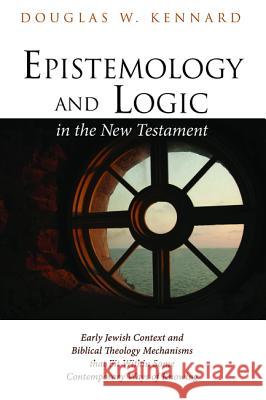Epistemology and Logic in the New Testament » książka
Epistemology and Logic in the New Testament
ISBN-13: 9781532608155 / Angielski / Miękka / 2016 / 280 str.
Epistemology and Logic in the New Testament
ISBN-13: 9781532608155 / Angielski / Miękka / 2016 / 280 str.
(netto: 129,24 VAT: 5%)
Najniższa cena z 30 dni: 134,95
ok. 16-18 dni roboczych.
Darmowa dostawa!
Biblical contributors express an oral stage engaging Christianity within a properly basic communal worldview similar to Alvin Plantinga advocates. This approach includes a communal Christian application of common sense realism within a worldview and rhetoric similar to Hillite Pharisaism. Each biblical contributor provided vivid testimony using rabbinic language and thought forms. For example, Jewish-Christian midrash re-appropriates Old Testament quotes and narrative in a new performative pesher manner to present Jesus as the Christ. Moving beyond the word studies of biblical epistemologists, Pharisaic-rabbinic Judaism use of biblical revelation, mystical vision, dream, or audible divine voice frame mystical empiricism similar to William Alston. Non-foundational realism facilitates a communal resilient oral tradition similar to the rabbinics. Additionally, Luke-Acts extensively engages Hellenistic historiographic method and the concept of ""witness."" When multiple interpretations occur concerning miracles, epistemic dualistic non-foundational Lockean epistemology emerges to contribute to the authority of communal kingdom testimony. Occasionally, this Lockean approach adds an internal transformation much as Jonathan Edwards modified Locke to set forth his religious affections as a divine virtue epistemology confirming the authentic narrow way through Peircean pragmatism. This internal knowledge provides self-referential confirmation for a personal relationship and filial knowledge. Each of these expressions of knowledge fosters an ultimate Kierkegaardian commitment to the Trinitarian Christian God. ""Few New Testament scholars are able to range effortlessly into the philosophical depths, but Doug Kennard is one who can and does. Working from the emerging consensus, namely, that the matrix of early Christianity is second temple Judaism, Kennard reconstructs the epistemology of Jesus and some of his earliest followers.He does so by taking seriously their ways of knowing through Scriptural exegesis, mystical visions and auditions, witness, and history. There is something here for both philosophers and exegetes.Well researched. Well documented. Highly recommended."" --David B. Capes, Academic Dean, Professor of New Testament, Houston Graduate School of Theology ""Kennard has written a unique book, so much so that one cannot think of another like it. . . . One wonders if the stars will ever align again so that someone educated in both epistemology and biblical studies will try to carry on this important conversation? If not, this will indeed be a one-of-a-kind fruit of the mature thought of a scholar giving us a unique lens through which to look at the gems that form the New Testament."" --Peter H. Davids, PhD, Visiting Professor of Bible and Applied Theology, Houston Graduate School of Theology Douglas W. Kennard, ThD, is Professor of New Testament and Philosophy of Religion at Houston Graduate School of Theology. He is author of Biblical Covenantalism--three volumes (2015), A Critical Realist's Theological Method (2013), Messiah Jesus: Christology in His Day and Ours (2008), The Relationship Between Epistemology, Hermeneutics, Biblical Theology and Contextualism (1999), The Classical Christian God (2002), and with Marv Pate, Deliverance Now and Not Yet (2003)."
Biblical contributors express an oral stage engaging Christianity within a properly basic communal worldview similar to Alvin Plantinga advocates. This approach includes a communal Christian application of common sense realism within a worldview and rhetoric similar to Hillite Pharisaism. Each biblical contributor provided vivid testimony using rabbinic language and thought forms. For example, Jewish-Christian midrash re-appropriates Old Testament quotes and narrative in a new performative pesher manner to present Jesus as the Christ. Moving beyond the word studies of biblical epistemologists, Pharisaic-rabbinic Judaism use of biblical revelation, mystical vision, dream, or audible divine voice frame mystical empiricism similar to William Alston. Non-foundational realism facilitates a communal resilient oral tradition similar to the rabbinics. Additionally, Luke-Acts extensively engages Hellenistic historiographic method and the concept of ""witness."" When multiple interpretations occur concerning miracles, epistemic dualistic non-foundational Lockean epistemology emerges to contribute to the authority of communal kingdom testimony. Occasionally, this Lockean approach adds an internal transformation much as Jonathan Edwards modified Locke to set forth his religious affections as a divine virtue epistemology confirming the authentic narrow way through Peircean pragmatism. This internal knowledge provides self-referential confirmation for a personal relationship and filial knowledge. Each of these expressions of knowledge fosters an ultimate Kierkegaardian commitment to the Trinitarian Christian God.""Few New Testament scholars are able to range effortlessly into the philosophical depths, but Doug Kennard is one who can and does. Working from the emerging consensus, namely, that the matrix of early Christianity is second temple Judaism, Kennard reconstructs the epistemology of Jesus and some of his earliest followers. He does so by taking seriously their ways of knowing through Scriptural exegesis, mystical visions and auditions, witness, and history. There is something here for both philosophers and exegetes. Well researched. Well documented. Highly recommended.""--David B. Capes, Academic Dean, Professor of New Testament, Houston Graduate School of Theology""Kennard has written a unique book, so much so that one cannot think of another like it. . . . One wonders if the stars will ever align again so that someone educated in both epistemology and biblical studies will try to carry on this important conversation? If not, this will indeed be a one-of-a-kind fruit of the mature thought of a scholar giving us a unique lens through which to look at the gems that form the New Testament.""--Peter H. Davids, PhD, Visiting Professor of Bible and Applied Theology, Houston Graduate School of TheologyDouglas W. Kennard, ThD, is Professor of New Testament and Philosophy of Religion at Houston Graduate School of Theology. He is author of Biblical Covenantalism--three volumes (2015), A Critical Realists Theological Method (2013), Messiah Jesus: Christology in His Day and Ours (2008), The Relationship Between Epistemology, Hermeneutics, Biblical Theology and Contextualism (1999), The Classical Christian God (2002), and with Marv Pate, Deliverance Now and Not Yet (2003).











